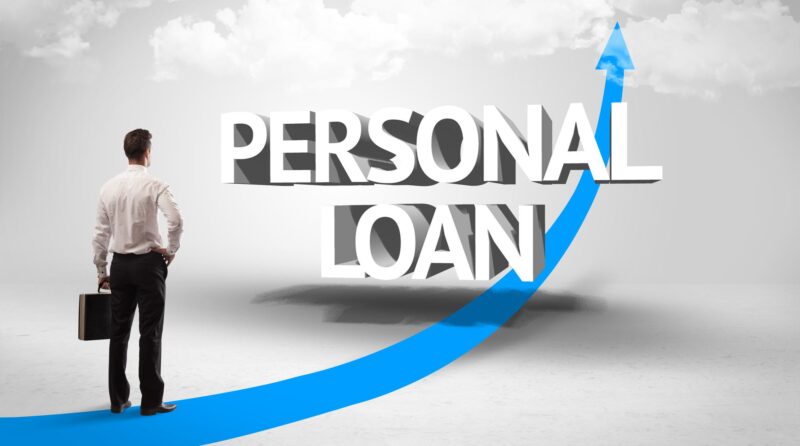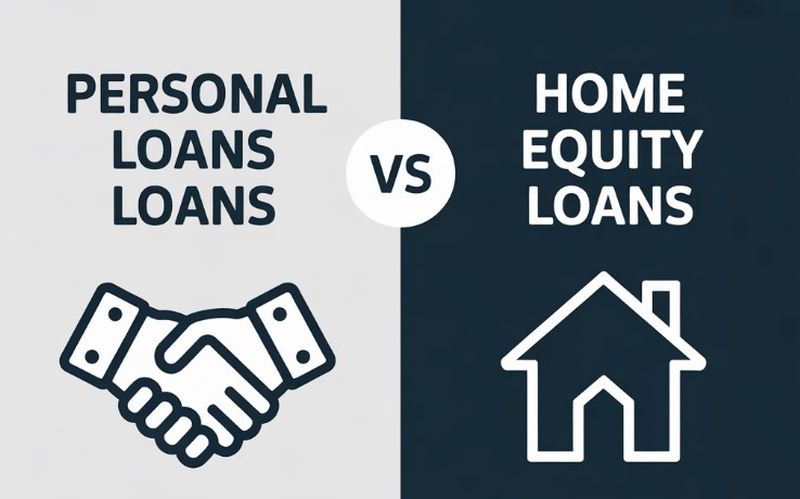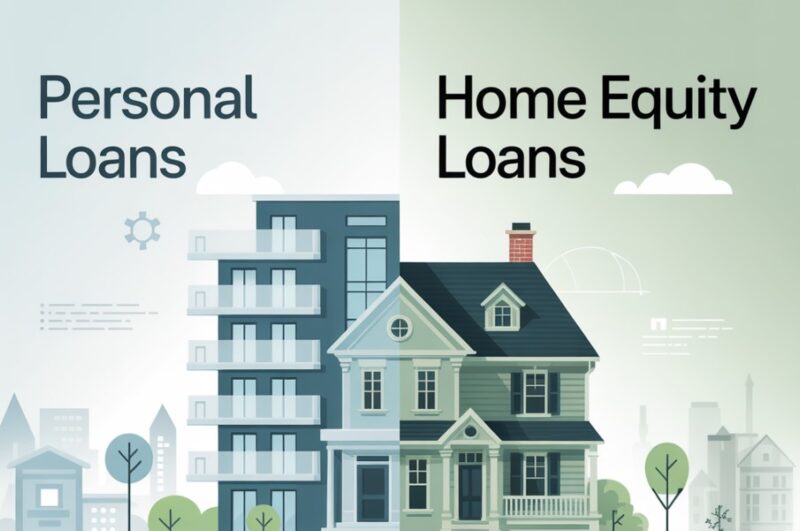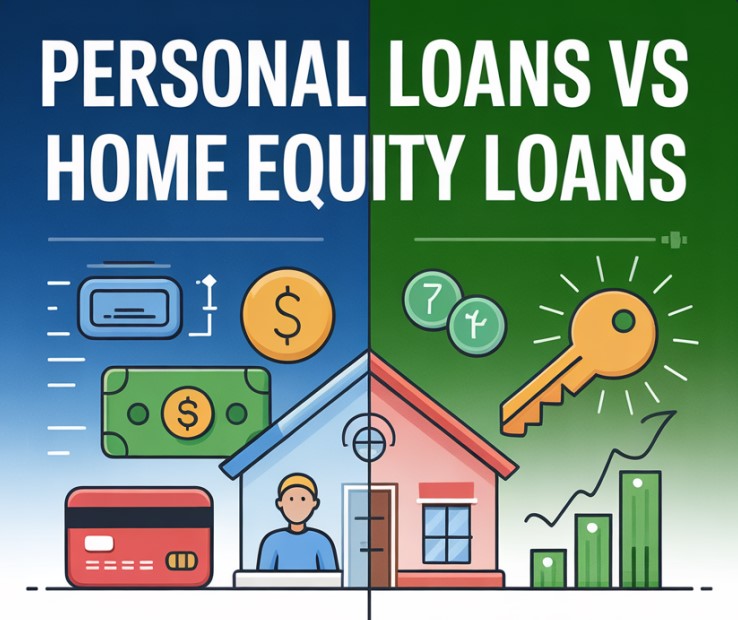When you need to borrow a substantial amount of money, two of the most common options are personal loans and home equity loans. The best choice depends on your financial situation, the purpose of the loan, and how comfortable you are using your home as collateral. In short, a personal loan makes more sense for quick access, flexibility, and no-risk borrowing, while a home equity loan is better suited for larger, long-term projects where lower interest rates justify using your property as security.
What Sets Them Apart
Personal loans are unsecured, meaning you don’t have to pledge your home or any other asset. Approval is based mainly on credit score, income, and debt-to-income ratio. These loans come with fixed interest rates and repayment terms—usually between 2 to 7 years.
Home equity loans, on the other hand, are secured by your home’s equity—the difference between your property’s current market value and the remaining balance on your mortgage. Because the lender has collateral, interest rates tend to be lower, but the application process is longer and involves appraisal and closing costs.
| Factor | Personal Loan | Home Equity Loan |
| Collateral | None (unsecured) | Home equity required |
| Approval Speed | 1–3 days | 2–6 weeks |
| Interest Rates | Higher, fixed | Lower, often fixed |
| Loan Amount | Up to $100,000 (varies) | Based on home value and equity |
| Risk | No property risk | Risk of foreclosure if you default |
| Best For | Quick, flexible financing | Large, long-term investments |
When a Personal Loan Makes More Sense

Personal loans are ideal when you need funds quickly and do not want to put your home at risk. Borrowers often use them for debt consolidation, medical expenses, or smaller home projects where speed and simplicity matter more than the absolute lowest rate.
For instance, if you plan to renovate a bathroom or replace a roof and don’t want to go through a home appraisal, a personal loan offers a clean, fast solution. Many lenders, such as home improvement loans, specialize in providing flexible personal loans tailored for renovation projects. You get fixed monthly payments, predictable terms, and the freedom to start your project without delays tied to property evaluations or equity checks.
Personal loans also make sense if you expect to sell your home soon. Since they are unsecured, they won’t interfere with your mortgage payoff or title transfer when you sell.
When a Home Equity Loan Is the Smarter Move
If you have significant home equity and plan a large or long-term expense—such as a full home remodel, tuition funding, or major debt consolidation—a home equity loan often wins on cost. Interest rates can be several points lower than personal loans, and the repayment period can stretch over 10 to 30 years.
Because the loan amount depends on your home’s value, it can be much larger than what most unsecured personal loans allow. This makes it ideal for high-cost projects that provide lasting value.
For example, homeowners with at least 20% equity can often borrow up to 80–85% of their home’s appraised value, minus any mortgage balance. On a $400,000 home with a $200,000 mortgage, you could potentially access $120,000 in a home equity loan—more than enough for extensive renovations or education costs.
However, there is an important trade-off: you risk losing your home if you fail to repay. That makes this option better for stable income earners with long-term plans to stay in the property.
Interest Rate and Fee Comparison

Interest rates are where the major difference lies.
- Personal loans: Typically range from 8% to 16% depending on creditworthiness.
- Home equity loans: Often range from 6% to 10%, but require closing costs that can total 2% to 5% of the loan amount.
Although the home equity option may appear cheaper, it takes longer to finalize and incurs additional expenses such as title searches, appraisals, and origination fees. Personal loans, in contrast, are typically funded within days with little to no upfront cost.
| Cost Category | Personal Loan | Home Equity Loan |
| Interest Rate (Typical) | 8–16% | 6–10% |
| Closing Costs | Minimal | 2–5% of loan amount |
| Funding Time | Within 1 week | 3–6 weeks |
| Tax Deductibility | No | Possible if used for home improvement |
| Flexibility | Higher | Limited to available equity |
What’s Better Overall?
If your main priority is speed, flexibility, and minimal risk, personal loans are the clear winner. They work best for borrowers who need cash now, whether to handle emergencies, pay medical bills, or take on smaller upgrades without the burden of home appraisal and paperwork.
If your focus is lower rates, high loan amounts, and long-term financing, home equity loans make more sense—provided you are confident about stable income and long-term homeownership. For example, a homeowner with solid equity can save thousands over the life of the loan, especially when using funds for value-adding projects like full-scale renovations or property expansions.
In most cases, people who don’t want to risk their property or can’t afford long approval processes find personal loans more practical. But those who can leverage their home responsibly find home equity loans a financially efficient option.
Realistic Scenarios
- Mid-size renovation: You need $25,000 to remodel your kitchen. A personal loan provides instant access, predictable payments, and no lien on your property.
- Major home expansion: You need $120,000 for an addition. A home equity loan could save tens of thousands in interest over time.
- Debt consolidation: If you’re juggling high-interest credit cards, either option can help, but a personal loan is faster and doesn’t risk your home.
- Emergency expenses: When timing is critical, personal loans are far simpler to secure.
Each option suits a different risk tolerance and timeline. Evaluating how long you plan to stay in your home, how much equity you have, and how quickly you need funds can clarify the best fit.
How Lenders Evaluate You
For personal loans, lenders focus on:
- Credit score (typically 650 or higher for good terms)
- Debt-to-income ratio
- Stable income and employment history
For home equity loans, they assess:
- Home’s market value and current mortgage balance
- Loan-to-value ratio (LTV, usually capped at 80–85%)
- Credit and income stability
These factors determine not just approval but also the rate you receive. Borrowers with high equity and strong credit can unlock excellent rates through home equity loans, while those needing quicker approval or having moderate credit often prefer personal loans.
Final Comparison Table
| Use Case | Recommended Option | Reason |
| Fast cash or emergency | Personal Loan | Quick approval and no collateral |
| Moderate renovation ($10k–$50k) | Personal Loan | Simpler and faster funding |
| Major renovation or education ($50k+) | Home Equity Loan | Lower rate and higher limit |
| Long-term fixed budget | Home Equity Loan | Extended repayment terms |
| No homeownership or low equity | Personal Loan | Does not depend on property value |
Bottom Line

Both loans can achieve similar financial goals, but the right one depends on your priorities. A personal loan is better if you value speed, simplicity, and flexibility. A home equity loan fits when you need a larger sum at the lowest possible rate and are comfortable using your home as collateral.

